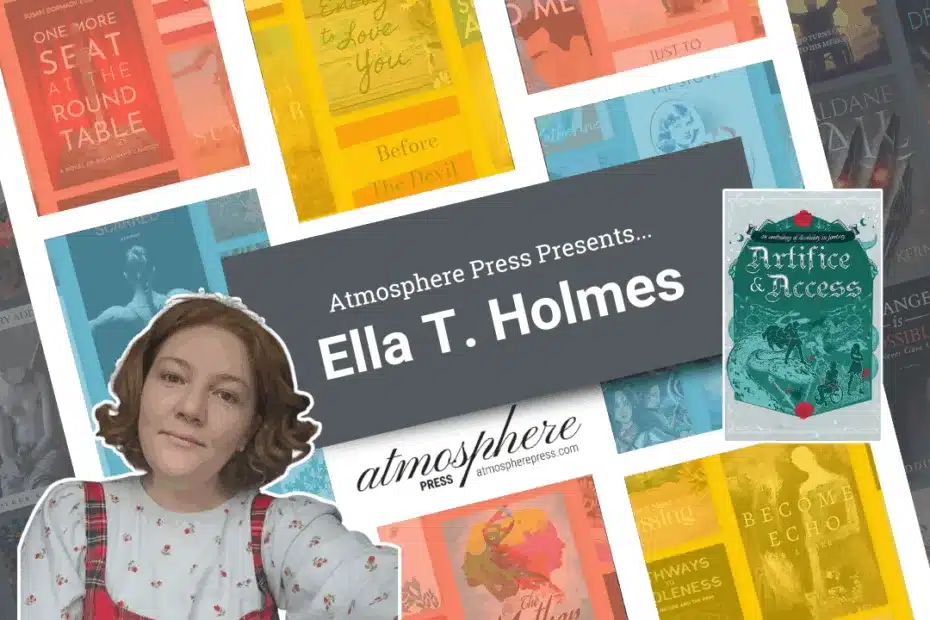An Interview with Ella T. Holmes

Ella T. Holmes doesn’t write to escape the world; she pokes holes in the one we’ve got and asks why we can’t do better. She maintains corporeal existence by patting cats, writing, and engaging in Disability Justice advocacy. Her work has been published in Antithesis, The Bitchin’ Kitsch, Jacaranda, Portside Review, and is forthcoming in Aurealis, among others.
What inspired you to start writing this book?
I had been doing a lot of research into the lack of accurate and non-ableist disability representation in media when I came across a huge Twitter debate around the subject of whether or not disability and/or disabled characters “belong in fantasy.”
In reaction to that, I decided to bite the proverbial bullet and finally use my crip-time and resources and skills to help uplift fellow disabled and chronically ill authors by creating an anthology. And what better genre to start the work than fantasy?
It just felt like the right time, and to be honest, I was full of righteous anger; disabled and chronically ill creatives are often rejected, ignored, or excluded from publishing and book spaces, and I’m tired of it. We exist, we resist!
Tell us the story of your book’s current title. Was it easy to find, or did it take forever?
Artifice & Access seemed like a nice and alliterative title for a collection of short stories about worlds with magic and different fights, denials, and successes of access to society and accommodations. It was fairly easy to find after a couple hours of perusing the dictionary and the thesaurus, and then consulting my contributors (as well as the internet) on what might roll off the tongue best. But to be honest, this title just felt right to me from the moment I paired those two little words!
If your book had a soundtrack, what are some songs that would be on it?
One of the contributors, Harper Kinsely, actually made a playlist with songs for the anthology! Some of the songs include ‘Soldier, Poet, King’ by The Oh Hellos, ‘Ready Now’ by Dodie, and ‘All This and Heaven Too’ by Florence + The Machine. I think anything folksy works really well, as well as music with sounds of nature all layered together.
What other professions have you worked in? What’s something about you that your readers wouldn’t know?
I used to be employed as a graphic designer and copywriter, but after COVID mitigations were rolled back, my workplace (and many others) were not willing to accommodate my disability needs. It’s an unfortunate reality many disabled creatives face, that contribute to our lack of resources and experiences of hardship, and one of the things that drives me to seek out and also write stories that put the onus of accommodation and safety on our systems and infrastructures, rather than on the individual.
Right now, I am a freelance graphic designer, editor, and sensitivity reader. I also work in disability advocacy on a volunteer and online community basis.
One thing readers don’t know about me is that I think about Shrek (2001) a very normal and neurotypical amount!
Who/what made you want to write? Was there a particular person, or particular writers/works/art forms that influenced you?
Writing has always called to me as a medium, whether it was songs, prose, or stories. I have been heavily influenced by Juliet Mariller, and I didn’t realise until I was 20 that being an author is a thing that I also could, perhaps, try to be. The stories I’d penned down or saved in dusty computer folders didn’t need to remain there like ghosts; they could be given a chance to live. Since then, I’ve become obsessed with the craft of writing. If you asked me to give a TED Talk about anything, there’s a 50% chance it would be on storytelling.
As for my current influences, I’m more influenced by ideologies, theories, and movements such as abolitionism, Disability Justice, and restorative justice.
What’s one thing you hope sticks with readers after they finish your book?
I hope that readers of all sorts enjoy the collection and realise there are so many different disability and chronic illness narratives that have yet to be told, read, and published. My contributors and I have genuinely been blown away by the responses to the collection that share personal anecdotes and let us know that they felt connected to it and seen by it in a way they haven’t experienced in the past. Artifice & Access is just one part of the work when it comes to uplifting disabled and chronically ill stories and authors, and I hope that these authentic and vulnerable stories strike at the heart of fantasy readers alike.
Are you a writer, too? Submit your manuscript to Atmosphere Press.

Atmosphere Press is a selective hybrid publisher founded in 2015 on the principles of Honesty, Transparency, Professionalism, Kindness, and Making Your Book Awesome. Our books have won dozens of awards and sold tens of thousands of copies. If you’re interested in learning more, or seeking publication for your own work, please explore the links below.
